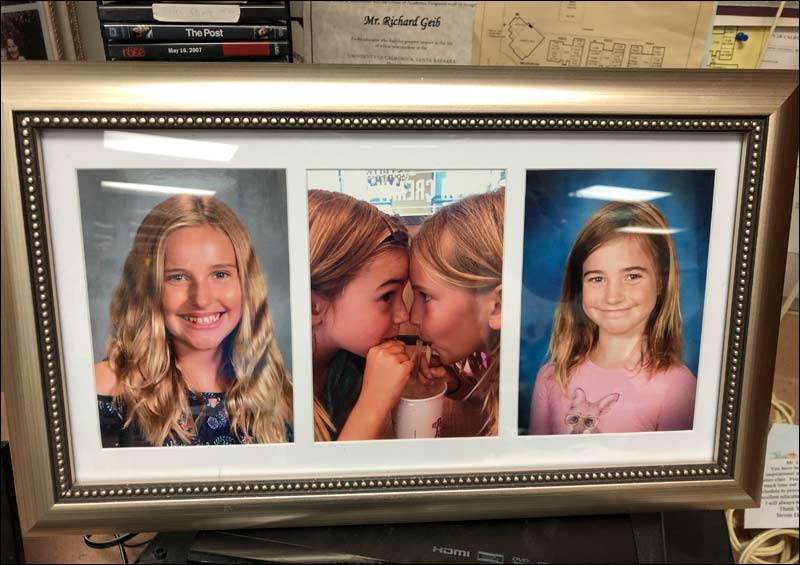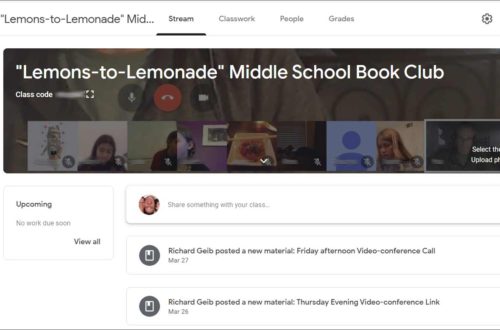Every weekday morning it is the same.
I race out the door no later than 7:30 am to take my daughters to school. I drop Julia off for her bus at 7:39, and then deposit Elizabeth no later than 7:43 at her school. I am in my own classroom standing tall and ready for students by 7:50. The bell rings at 7:55 and at 8:00 sharp class begins. My schedule is tight. Minutes count.
I teach all day long, with some 45 minutes free for bathroom breaks and lunch. The compressed nature of my teacher’s workday means I am done in time to pick up Elizabeth from her school — but it is close. Not long after my last class ends am I out the door to pick to get Elizabeth; in an instant I take of my “teacher hat” and put on my “parent hat,” Elizabeth is with me by 2:45. It is busy, busy.
This afternoon I had Elizabeth Anne at home by 3:00 pm. I gave her a snack and we worked on her 3rd grade homework. Then I took a brief nap, and Elizabeth dived into the second Hunger Games book, Mockingjay. Like her sister before her, when Elizabeth takes a liking to a book she will do little else until she has finished it. She devours a book she likes with single-minded intensity. So our afternoon went.
Elizabeth and I spend every morning commute and afternoon after school together. It is her and I hour after hour — the good, the bad, and the ugly. I often feel a bit overwhelmed, and when my wife Maria rolls in around five pm I am more than ready to be relieved of duty. I am in need of a break — ready for some “alone time,” almost for the first time that day. I often go to the pool and swim laps for 45 minutes, but it is the alone time I need more than the physical exercise. The pool is a wonderful place to be alone with one’s thoughts. I return home re-charged to read bedtime stories and to put the girls to sleep.
But this year is different. Julia, age 11, now attends middle school where she is in sixth grade. For five years it was Julia, not Elizabeth, who was my constant companion after school. Julia completed her elementary school homework and I checked it. We read books together and separately. We studied new vocabulary words, and we memorized and recited poetry. She irritated me and I irritated her. We laughed together. We were bored. The hours they all added up over these long years of elementary school.
Now I barely see her, it seems.
Julia has volleyball or soccer practice after school almost everyday. Sometimes she takes the bus home by herself. Occasionally Julia has more than one activity after school. I rarely see her before 6:00 pm. Often I don’t see much of Julia after that. We don’t get the chance to talk much, especially compared with previous years.
I wonder if this is what it is like for parents who work until 6:00 pm and see their kids a bit at dinner and at bedtime? The contact between parent and child seems thin and tenuous. Your child is a somewhat a stranger. You don’t have the time to hear much about the manifold activities and emotions of the day. Unless you consciously schedule it, there is little “daddy-daughter” time.
This year I feel Julia is slipping away from me. I wonder how much daily drama happens in her life that I have no idea of — and isn’t that normal, as your child grows older and more independent? In retrospect, I look with new appreciation on all the time I spend with Julia when she was in elementary school. A huge aspect of being a parent, it seems to me, is just being there — being present, day after day. Paying attention.
I read a while back that teenagers, despite sullen contrariety, actually want their parents near them. They don’t necessarily want to talk to to their parents, but their nearby physical presence is comforting. I can see that.
I do have some time around 9:00 pm when I can connect with Julia. She is getting ready to go to sleep. She pleads, “Daddy, come check on me!” She wants me to stick my head in her room every ten minutes or so and look in. Sometimes Julia asks me to come cuddle with her. It is dark and we talk before she falls asleep.
Maybe I should really take advantage of these bedtime moments during her middle school years?
Maybe I need to schedule more consciously “daddy-daughter” time?
I often don’t know quite what to say to Julia at bedtime. After the entirety of all the day’s events, where to start?
Experience has taught me not to ask, “How was your day?” if I want anything more than monosyllabic responses like, “Good.” I have to ask who she ate lunch with, or what she did in Mr. Wulff’s class. Be specific.
“Are the girls mean in your classes? Do you see much cruelty?”
“Are boys still ‘yucky’? You still could care less about them?”
“Is there anything you want to talk about?”
I am just reaching out, trying to find some topic that is on her mind. I wonder what the weather is like inside her head. What is going on there?
We were so close in elementary school, and I hope to retain that closeness as Julia ages. How?
Yesterday I proctored the PSAT to a bunch of high school students I did not know. For the last hour of the session the school gave me a dated, formulaic lesson plan about online bullying to teach. I ignored most of the stale lesson plan, and I just talked with the kids about bullying and cruelty — online and otherwise, in school and out. When that subject began to be played out and I had time to kill, I did what I often do. I asked the class the following question:
“Everyone, please give me advice on how I can be a better father to my daughters. I never was a daughter myself, so it is hard for me. Help me out! Give me tips!”
Hands rise up as students are ready to offer advice. They spoke from the experience of their own lives.
“Don’t be too strict”
“Don’t be too lax!”
“Watch your daughter’s friends! Pay attention to who they hang out with!”
“Don’t let them onto social media until they are in at least eighth grade!”
The students had plenty to tell me. The usual bromides were offered. I paid close attention. One young lady had said nothing, and I asked her her name and what she thought.
“Don’t pry into your daughter’s private lives. Give them their privacy.”
Wow.
That seems excellent advice. Especially as Julia and Elizabeth get older and enter adolescence.
With Julia at bedtime I will try to ask fewer prying questions and instead tell her more about myself and what happened with me during middle school. I will start discussions that Julia can move wherever she might want. I have seldom talked about my own past with Julia. I will try not to pry.
Hopefully these discussions can open the door for Julia to talk to me about herself and important issues when they come up. Because, in the next ten years, stuff will come up, unless I am much mistaken. Through my job I have seen so many teenage girls over more than two decades. They often have such complicated inner lives. Growing pains, adolescence, hormones, self-esteem, boys — all of that.
So if I am present and open to hearing about it, Julia might talk to me about what is important in her life. Or not?
I am sure Julia, as she gets older, will conclude that many (if not most) of the activities in her life are none of my business. Fair enough. But in those moments when some dilemma, crisis, or trauma arrives, Julia might need someone to hear and support her. She might benefit from a parent willing to listen and give support.
Let it be that I am paying attention when such a day arrives. That I be present. That the lines of communication and trust are always open.
Let this happen in my relationships with both Julia and Elizabeth.
Let this continue even as adolescence gives way to adulthood and beyond —
To the extent that I can help it to happen.
Amen.





